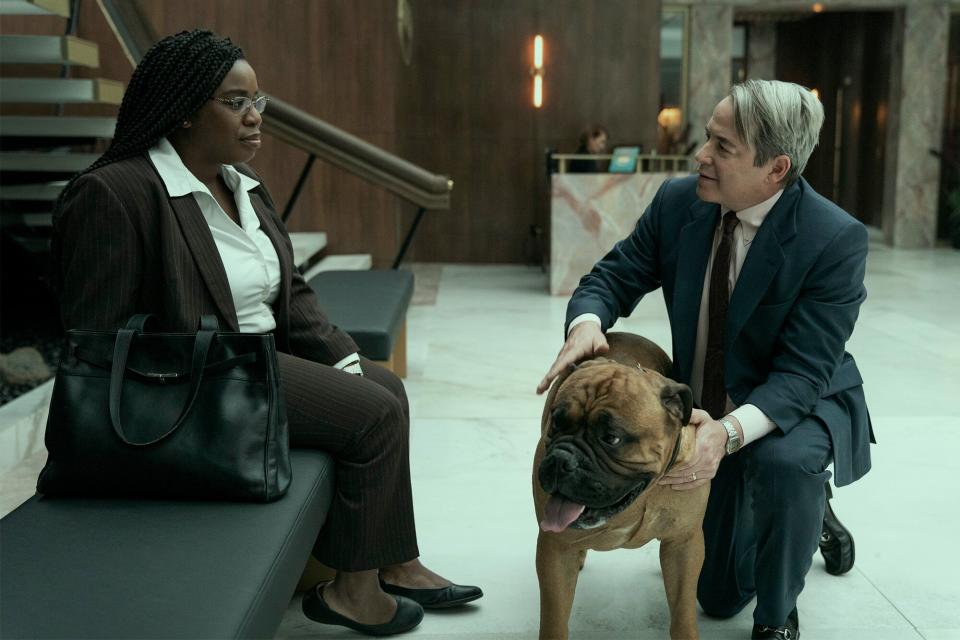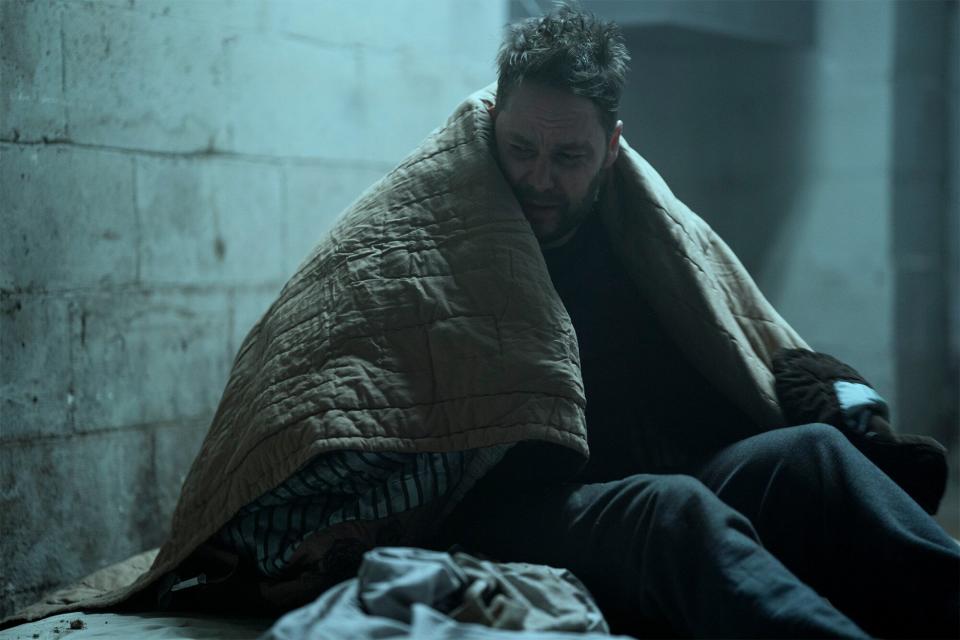Painkiller review: Matthew Broderick leads Netflix's off-kilter take on the opioid crisis

- Oops!Something went wrong.Please try again later.
- Oops!Something went wrong.Please try again later.
- Oops!Something went wrong.Please try again later.
Every episode of Painkiller, Netflix's new drama about Purdue Pharma and the opioid crisis, begins with a disclaimer from a real-life grieving parent who lost a child to OxyContin. After noting that "certain characters, names, incidents, locations, and dialogue have been fictionalized for dramatic purposes," these parents share their terrible truth. "The death of my son Patrick isn't fiction," says a woman at the start of episode 3. "He died at age 24 after having ingested just a single oxycontin. And I will tell you that time does not heal all wounds." She is holding a photo of herself as a young mother cradling newborn baby Patrick in her arms.
A few scenes later, we reach the part in the story where Purdue Pharma receives FDA approval for OxyContin from a man named Curtis Wright (played here by series co-creator Noah Harpster). As Rick Ross' "Every Day I'm Hustlin'" throbs on the soundtrack, Purdue exec Richard Sackler (Matthew Broderick) is depicted doing a celebratory dance in his silk pajamas, alongside his long-dead mentor, Uncle Arthur (Clark Gregg). And Harpster — playing Wright, who later went to work for Purdue — proceeds to dive into a backyard pool while two cheerleaders in skimpy, OxyContin-branded uniforms gleefully wave their sparkly pom-poms.
The juxtaposition of a real mother mourning her dead son with these ghoulish and fanciful vignettes is obscene — and that seems to be Painkiller's point. The weird, well-acted series from Harper, Micah Fitzerman-Blue (A Beautiful Day in the Neighborhood), and director Peter Berg uses jarring stylistic shifts, macabre surrealism, and painfully simple tragedy to dramatize Richard Sackler's and Purdue Pharma's remorseless quest for market share. Painkiller's incongruous tone renders it less emotionally resonant than Hulu's Peabody Award-winning Dopesick, and the six-episode series does not have much new to offer to the story other than a propulsive and righteous rage.

Keri Anderson/Netflix Uzo Aduba and Matthew Broderick in 'Painkiller'
After the death of Uncle Arthur, who pioneered the art of slick (and sometimes deceptive) pharmaceutical marketing, Richard Sackler was looking for a blockbuster drug to transform Purdue Pharma into a major revenue stream for the family. By now, some 20-plus years into America's opioid crisis, what came next is well documented: the massive success of OxyContin, marketed as a minimally addictive opioid; the ballooning rates of addiction, addiction-fueled crime, and deaths; the nearly two-decade fight on the state, local, and federal level to hold Purdue Pharma accountable for its criminally reckless promotion of the drug.
Painkiller — which is based on Barry Meier's 2003 book and Patrick Radden Keefe's 2017 article in the New Yorker — uses multiple storylines to explore how Purdue and the Sacklers built their deadly empire. A composite character named Edie Flowers (Uzo Aduba), a former medical examiner in the U.S. Attorney's office, arrives in D.C. in 2015 to consult with a law firm leading a class-action lawsuit against Purdue. Having gone to battle with Purdue in the past alongside US Attorney John Brownlee (Tyler Ritter), Edie is both well versed in the company's practices and extremely jaded about the possibility of bringing the makers of OxyContin to justice, and she serves as the viewer's de facto tour guide through the Sackler house of horrors.

Keri Anderson/Netflix West Duchovny and Dina Shihabi in 'Painkiller'
Taking a cue from marketing master Arthur, Richard Sackler and Purdue recruited an army of attractive sales reps to spread the gospel of OxyContin — a drug the company falsely claimed had "less than one percent" risk of addiction in patients — to doctors around the country. The show depicts a recent college grad named Shannon Schaeffer (West Duchovny) who, broke and looking for a way out of her parents' house in Ohio, is encouraged to join Purdue by Britt (Dina Shihabi), a confident and striking blonde. Britt's chic wardrobe, spacious apartment, and hefty annual bonuses are a testament to how lucrative the drug business can be. Armed with what she believes is solid medical data about the safety of OxyContin, Shannon shadows Britt as she cajoles the doctors on her beat with flattery, flirtation, Oxy-branded plush toys, and other silly swag.
And down in North Carolina, a fictionalized consumer named Glen Kryger (Taylor Kitsch), a married father of two who runs an auto repair shop with his wife, Lily (Carolina Bartczak), suffers a back injury on the job. When the pain persists, Glen's family doctor (Darrin Baker) gives him a prescription for OxyContin. It works all too well.

Keri Anderson/Netflix Taylor Kitsch in 'Painkiller'
This is essentially the same structure as Dopesick, which followed the Sacklers and Purdue, two attorneys in John Brownlee's office leading an investigation into the company, a well-meaning drug rep who befriends a small-town doctor, and a working-class woman who becomes addicted to Oxy after an on-the-job accident. Dopesick was brutal, infuriating, and intensely moving, and Painkiller never reaches the same level of humanity and pathos.
But the performances are all strong: Aduba delivers cathartic anger and despair as Edie, and Kitsch is dependably empathetic as the everyman who falls victim to what is essentially heroin in a time-release coating. Duchovny brings a winning innocence to Shannon, whose ascent up the ranks at Purdue comes with increasingly unsettling revelations.
Broderick plays Richard Sackler like an alien in a human suit who's not trying all that hard to fit in. It is a choice, and one that jibes well with Painkiller's off-kilter approach to the subject matter. "You evidently have impeccable taste," Richard says to his Uncle Arthur, in one of their many imagined conversations. "I have no taste. Zero. I care about making money and winning. That's it." Perhaps the one thing Painkiller does offer that Dopesick didn't is the extremely satisfying (though thoroughly fictional) depiction of Richard Sackler getting punched repeatedly in the face. What a rush. Grade: B-
Painkiller is streaming now on Netflix.
Sign up for Entertainment Weekly's free daily newsletter to get breaking TV news, exclusive first looks, recaps, reviews, interviews with your favorite stars, and more.
Related content:

